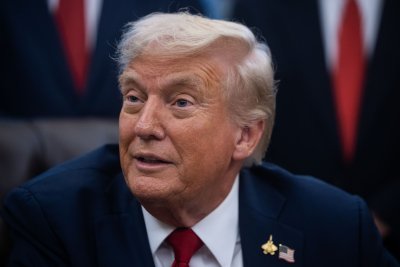Oct. 2 (UPI) — The United States is blacklisting 44 individuals and firms accused of being involved in Iran’s nuclear program and weapons procurement network, as the Trump administration continues to increase its so-called maximum pressure strategy on Tehran.
The sanctions were announced by the U.S. State and Treasury departments on Wednesday, days after the restoration of United Nations sanctions and other punitive measures on Iran.
Among sanctions announced Wednesday, the State Department hit five individuals and one entity connected to Iran’s Organization of Defensive Innovation and Research, the successor of Iran’s pre-2004 nuclear program and originally sanctioned by the administration of President Barack Obama in 2014.
Known by the initials SPND, the Tehran-based entity, founded in February 2011, is responsible for nuclear weapons development research.
The State Department said it blacklisted Reza Mozaffarinia, director of SPND, Ali Fuladvand, head of the Research Directorate at SPND, and Mohammad Reza Ghadir Zare Zaghalchi, longtime SPND-affiliated official and head of U.S.-designated Shahid Fakhar Moghaddam Group.
Andisheh Damavand International Technologies was also blacklisted for facilitating the travel of Iranian nuclear experts to Russia to pursue sensitive duel-use technologies as was its CEO, Ali Kalvand.
The sanctions comes after the State Department blacklisted three Iranian officials and one entity linked to SPND in May.
Coinciding with the State Department action was the Treasury designating 21 entities and 17 individuals accused of facilitating the acquisition of “sensitive goods and technology” for Iran’s Ministry of Defense and Armed Forces, it said.
“The Iranian regime’s support of terrorist proxies and its pursuit of nuclear weapons threatens the security of the Middle East, the United States and our allies around the world,” Treasury Secretary Scott Bessent said in a statement.
Among those targeted Wednesday were individuals accused of being part of a network operating out of Iran, Germany, Turkey, Portugal and Uruguay that was procuring military aircraft equipment for Tehran, including U.S.-manufactured helicopters.
The Treasury said its sanctions were part of President Donald Trump‘s February memorandum reinstating the maximum pressure campaign of his first administration.
In 2018, Trump unilaterally pulled the United States from an Obama-era accord, which aimed to prevent Iran from securing a nuclear weapon. Calling the multinational joint Comprehension Plan of Action “defective at its core,” he then reinstated sanctions against Iran in hopes of coercing it back to the negotiation table on a new deal.
Instead, the reclusive regime advanced its nuclear program.
The United Nations last week reinstated sanctions under a so-called snapback mechanism that had been terminated when the JCPOA was implemented in 2016, and which Trump had sought to have reimpose since 2018.
The U.S. State Department said Wednesday’s sanctions were in support of those “snapback” punitive measures.
“The United States is committed to denying Iran all paths to a nuclear weapon,” Secretary of State Marco Rubio said in a statement.
“We will not hesitate to hold accountable anyone who supports Tehran’s proliferation activities.”
